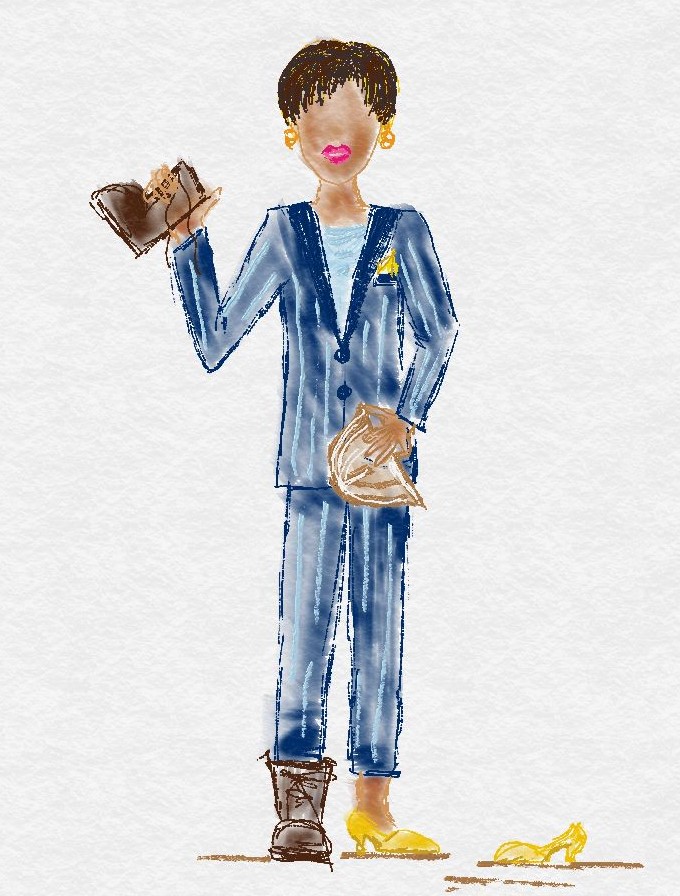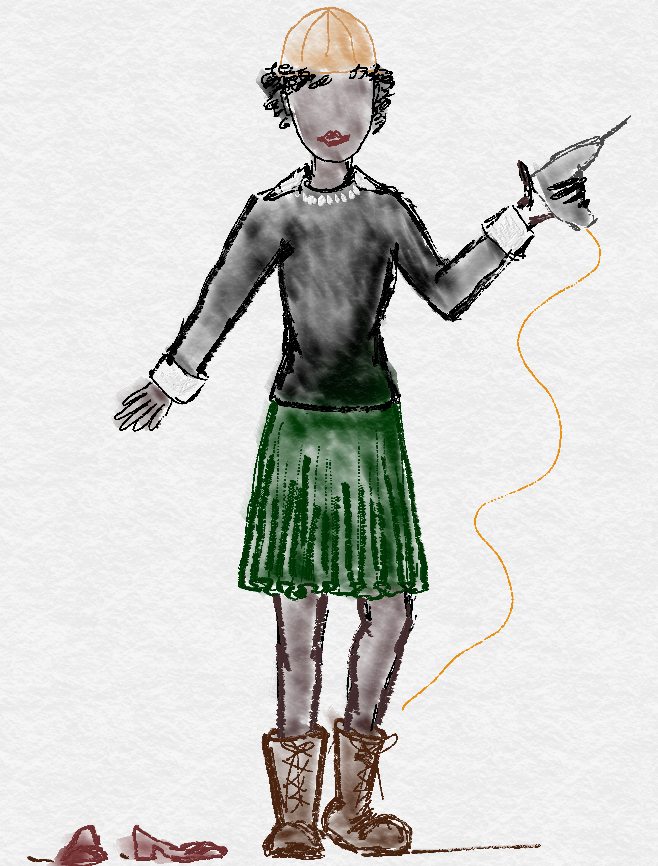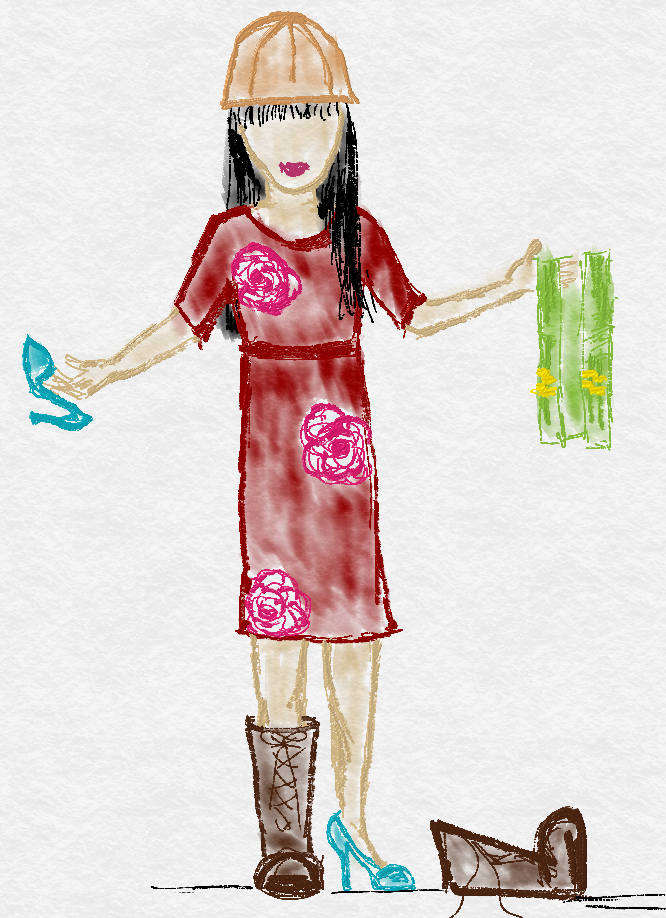Success
Time’s Up II
Part II – Us

Previously we addressed the unsuitable behavior of some men in the workplace, and we offered guidelines for those men who were either sincerely or disingenuously unable to tell the difference between appropriate and inappropriate actions. The other variable in the equation that adds up to a happy workplace is our behavior. Yes, us, the women who are the subjects of this stramash. We may be the victims, but that does not mean we don’t have certain responsibilities in moving toward a solution to the problem.
Wait, what? Somehow the wrong attitudes and actions of other people create responsibilities for us? But we didn’t do anything. Why should we have to work to take care of a problem caused by someone else?
We have a responsibility here because this isn’t Candyland. This is real life, and we live in a world that has been evolving for about 4.54 billion years, give or take 10 to 50 million years. Every ice age, every extinction, every social change, every shift in hemlines has been a product of interdependent factors in a complex environment. You can sit on your princess throne and say that men should just change and life should just be fair. Good luck with that.
For our part, it will only help our cause if we are proactive and do everything in our power to stop the bad guys and enlighten the good guys. Sure, you could just sit around and be mad, waiting for social change to sweep across professional society like a special effect in a science fiction movie. Your desired results will take much, much longer that way, and you will be disconnected from the end result. Instead, we can all take some basic steps to help create an environment that is fair and beneficial to all of us.
1. Repeat after me, “Not all men are bad.” (Okay, you get a pass on this if some guy just broke up with you on a Post-It and you’re out drinking with your girlfriends). It’s funny, because even most guys I know will say, “Men are pigs.” The implication is that men are led around by their baser instincts and, therefore, will always be low quality humans who make bad decisions. But that’s just not true. Even from a statistical standpoint, it is highly unlikely that 49% of 7 billion people would ALL have sub-par character. And assuming that all men are bad is a negative attitude that will ill prepare you for helping your co-workers and bosses and clients evolve into more enlightened colleagues. Saying that all men are bad is a defeatist attitude that will not move us forward even an inch (or a centimeter for our Canadian and European readers).
2. We have to be aware of our own behavior and how it affects the perception of the men around us. I will admit that I sometimes have difficulties with this. I am a toucher – if you’ve met me, I’ve probably hugged you. I routinely grasp the nearest person’s arm to make a point, and I’ll squeeze a colleague around the shoulders to offer congratulations. I have learned that this sometimes generates confusion with my male colleagues. Yes, I’m proud of you for getting that journal article published, but no, I don’t intend to sleep with you as an attaboy. Unfortunately, many men will admit that they are less than adept at reading subtle signs and differentiating between behavior types in various situations. Simply put, some guys think you must want to sleep with them because you squeezed their arms. They are not pigs, they’re just…clueless. It has taken me awhile, but I have learned that I need to be more restrained in many situations to avoid confusion. It doesn’t mean I have to be cold and unfriendly, I just have to pay more attention to men’s reactions and err on the safe side until I feel like I know someone well. This doesn’t mean I’m being unduly burdened, it just means I’m being a responsible adult.
It goes without saying that flirting on the job will broadcast the idea that you might be receptive to inappropriate actions. Certainly, no means no. But you can avoid the pothole more easily if you don’t steer the car in that direction.
3. We have to speak up every time. Sometimes we endure an ugly situation and we emerge unscathed. The temptation is to let well enough alone and move on. Say your boss got physical with you, you gave him what-for, and now he’s acting respectful and giving you a wide berth. You consider just chalking it up to a bad memory and never speaking of it again. But what about the next woman? Maybe she’s not as brave as you are. Maybe she has four kids at home and she’s petrified she’ll lose her job. So the boss just moves on to harassing her. When she finally gets up the nerve to blow the whistle, the supporting evidence you have that would have helped her establish a pattern of behavior isn’t there. Management doubts her claim, because they usually do at first, and when you finally come forward, HR says, “If this really happened, why didn’t you complain?” When you say that the issue was solved, people inevitably look at the other woman and say, “Why didn’t you just do what she did?” Everyone becomes distracted from the fact that what the guy has been doing is WRONG. We need to address bad behavior every time.
It should be noted that at some point in time your justifiable whistle blowing most likely will result in an accusation that you’re just a whiner. You’re too sensitive. You caused the problem. Or, my favorite, you’re just hard to work with. Almost every woman in our field over the age of 30 has been told this at some point because she made public some guy’s bad behavior. I wish I could say don’t worry about it, it won’t happen. But it will, so you have to tell yourself in advance that you’re doing the right thing, and you’re a delightful person. No one can make you feel bad about yourself if you don’t let them.
4. We must always use our power for good. On the opposite side of justifiable whistle blowing is using sexual harassment as a tool to get back at a man with whom you have a personal dispute. Just like sexual harassment, false accusations are wrong. Ruining a man’s reputation because you don’t like him is wrong. Claiming sexual wrongdoing when a workplace romance goes horribly awry is wrong.
I once worked with a woman who actively pursued one of the engineers with the company, even seducing him at his desk after hours. When the short-lived affair went south, she got angry with the engineer and went to the boss to say that she was offended that Playboy magazines were kept in the men’s restroom by this engineer. She felt sexually harassed by this. Obviously, her campaign was personal, and I didn’t back her up when the boss asked me if I also felt compromised. She was furious with me, but I told her that her claim would make it difficult the next time a real problem happened.
This list is not comprehensive, because the best defense is a great offense. But probably our biggest responsibility in our very complicated campaign to rid the workplace of sexual inequalities is our need to support our sisters. This does not mean you have to agree with every opinion of every woman you know, and we don’t all have to be friends. But when another woman needs support, whether it be help reporting a problem or a sympathetic ear to try to figure out how to deal with a difficult boss, you owe it to YOURSELF to give her whatever she needs. The military doesn’t teach the infantry to stick together just to promote good social skills. Don’t ever leave anyone behind and you won’t get left behind.
Time’s Up
Part I – Them

The recent Harvey Weinstein revelations, #metoo movement, and Time’s Up campaign have had a number of consequences, most of them quite fabulous. Let’s start by saying that I have ZERO problem with the fact that a bunch of actresses finally brought attention to a problem a lot of us have faced for years. Some women I know have complained that women in “fluffy” jobs are celebrating victory when women all over the world have been suffering with this scourge for millennia. Seriously? Do we care who caused the tide to turn? I don’t. If little green female leprechauns happen to be the ones to breach the dam of harassment because they complained about the male leprechauns grabbing their lucky charms, I don’t care. Kudos to Ashley Judd and Reese Witherspoon and the others for speaking for all of us. I’d thank them in person with a vat of chocolate chip cookies if I could.
Not surprisingly, the scandals have led to a lot of men claiming to not understand the rules. Some of these guys are sincere and concerned that they have been doing things inadvertently that might make women uncomfortable. Some of the men are irritated that they don’t get to do whatever they want and complain that the new rules are “just too hard to figure out.” As usual, they try to put the shadow of blame on us by characterizing our complaints as vague and arbitrary. They attempt to cast us as insensitive by insinuating that we’re no longer receptive to “nice” gestures. Other guys feign ignorance and innocence and claim the nuances are just too difficult for the average guy to comprehend. And still others are just hateful sexists who don’t care whether they make us uncomfortable and use the controversy to fuel their misogyny.
My favorite comments are from guys who very obviously understand what is suitable and what isn’t but claim that “There are just too many gray areas.” Really? I think in most cases the gray areas are products of willful confusion. For every guy who truly is trying to understand where the boundaries in his professional relationships should be, there are two guys who profess not to know whether or not they should be putting their hands on the thighs of young female employees. “What? That’s a problem? I can’t believe you’re faulting me for showing a gesture of comfort to my young, inexperienced subordinate.” Right.
For these poor, well-meaning, caring individuals, I offer the following test. Cut it out and hand it out as necessary when this question arises. When a guy is really confused about whether or not to do/say something to one of his female colleagues or employees, tell him to ask himself the following questions:
1. Would you tell your wife about it?
2. Would it be okay if another guy did/said it to your daughter?
3. Would you publish it in your church bulletin or company newsletter?
If the answer to any of these questions is No, then DON’T DO IT. If you’re not sure, then DON’T DO IT. See how easy that was?
If a guy starts to come up with clarification questions or comments (i.e. “Do you mean would I describe it in detail?” “Does it matter how old my daughter is?”), you know he doesn’t really want to know the true answer. Those are the guys who aren’t really asking to understand – they’re asking to try to prove why their historic pattern of behavior was okay.
On the other hand, there are a lot of very nice, caring guys out there who actually are concerned and well-meaning when they put a hand on your shoulder to ask if you’re okay. They tell you that you look fabulous today because it always puts a smile on your face. And they help you with your coat and give you a hand to get up from your chair because they weren’t raised by wolves. We have to appreciate the good intentions and manners lest we drive them away forever.
Actually, communication is a tool that men easily could use in these situations, but they don’t. If a man is not sure if it bothers his young female protégée when he takes her hand to help her out of the car, he can ask her. Direct communication is a revolutionary concept, but is rarely used, particularly by people in the engineering profession. (We’re not known for our social prowess). We women have to be receptive to such questions and answer honestly. If it looks like your boss is trying to be a good guy, help him out.
The concept that actually is difficult to grasp for men in supervisory positions is that a subordinate woman might feel she has to comply with whatever her boss does or she’ll lose her job. This feeling may not be evident to the boss…at all. But a 22-year-old brand new female employee is still a novice in the world, and her perception of the power structure at work might lead her to believe that her job would be in jeopardy if she expressed how she felt about her interactions with her boss. As such, the boss should ALWAYS err on the side of caution. Is it really necessary to pat a young engineer on the back when he tells her she did a good job? Must he tell the young project manager that she looks great in that outfit? It’s not essential to the job and the supervisor doesn’t know the employee well, the answer is no. If it’s going to create all of this mental angst and confusion (for both the supervisor and the employee), why do it?
As a caveat, it should be stated that there are many, many male and female professionals who have longstanding friendships with members of the opposite sex, (contrary to what you learned in When Harry Met Sally). Theoretically, if you have a good friend who is not your superior or subordinate, the lines of communication are open, and a guy can ask a woman, “Can I put my hand there or does that offend you?” If she can’t give him an honest answer, they aren’t really friends.
The problem of sexual harassment is not simple, and no one set of rules can answer every conceivable question. But the cat is out of the bag, the worms are out of the can, the grout has busted out of the pipe. We need to have a real dialogue with those great, quality guys we work with every day, to help them understand how to move from unsuitable cultural customs to behaviors that benefit all of us. For the rest of the guys, the ones who “just don’t understand,” we’ll make flash cards.
When One Gate Closes, Another Opens
And In Second Place…
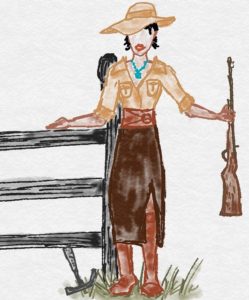
First Runner Up in our anniversary contest, Lucky Nagarajan is a powerhouse in a tiny package, a true spitfire. She is never without a smile and tackles every new task with a positive attitude. She obtained her Master of Science in Geotechnical Engineering at the University of Texas at Arlington and since then has been flexing her dirt muscles all over the United States. She currently is Business Development Manager and official Skirt in Dirt for Skyline Steel. If you know her, Elizabeth Taylor in “Giant” (1956) will come to mind as you read this story.
Lucky’s Story:
Being in the field was and is still fascinating to me. Just getting up at the crack of dawn and working till the last ray of daylight, safety meetings, no restrictions to working in extreme conditions (well most of the time), working with people of different cultures and personalities, etc. The list can go on and on. Another best part about my field life was that I got to visit some of the remote locations of the country. Everyday posted a new and interesting challenge.
A few years ago, I was in Aberdeen, SD for a project. It was October and winter was starting to kick in. I checked in to the hotel and saw pheasant “bird” pictures, awards, beautiful taxidermy birds and noticed safe hunting posters in the lobby. It was late in the night, I was totally exhausted and cold, so I didn’t feel curious enough to ask about any of this. After “not so good” sleep, I came down to get breakfast bright and early. I see only men in the breakfast area in camouflaged clothing. They all looked up at the same time to see who I am. Not knowing what is happening, I asked the courteous lady who offers me piping hot coffee what’s going on. It happens to be the first day of pheasant hunting in good old Aberdeen. Curiosity got my ear and I started listening to people’s conversations. I got to know successful and not so successful stories about their hunting, challenges of transporting the meat after skinning the animals and so on and so forth. This is like entering an unknown, exciting world of Americans to me. So I finished my breakfast and headed out to the site.
In Aberdeen, once you leave the college town, you don’t see too many people around. Miles and miles of flat farm lands, houses every mile or 2, dogs outside the house just waiting for their owners to let them in the house, horses and cows happy to see daylight and eating away; I am enjoying the rising sun. Winter is beautiful even in this tiny little town.
Finally, with help from my GPS on the phone and borrowed Garmin, I reached the site. There was a crew on site already waiting to start our safety meeting. I saw the truck but no human beings. The farmer at the site had his cattle for grazing out in the open and strong barb wire fence to avoid losing them. I drove up to the manmade fence gate, got out of my car and tried to open it. If you know what I am talking about, these are not like any other fence gate, where you have a latch or have a handle. Mostly, it is a loop of barb wire that is attached to a moving post. You drag this moving post to the stationary post and then throw the barb wire loop onto the stationary post. This loop goes over the stationary post almost 1/3rd of the length of the post itself. Finally, I got it open and drove in. Now, the next thing is to close it so the cows don’t get out.
If you have seen me, you know how tiny I am. This type of fence gate usually needs a good amount of muscle on you to close. I struggled for a few minutes then realized this is definitely not my cup of tea. I walked down to the area where the crew was and shared my dilemma. These guys were somewhat young and huge compared to me. They were surprised to see a female from a different country and someone as tiny as I am. One of them agreed to go over to close the gate.
Without any further delay, we started our safety meeting. First question they asked me was “How old are you?” I was taken aback and not sure what to say. Of course, it made me feel very young and I contemplated if I should really disclose my age to the strangers. I smiled at them and went on with our meeting. I figured out that our roles were independent on this site and they might be done with their task before me. So, before we get to our tasks, I asked them politely to somehow keep the gate open so that I don’t have to battle with it again.
I started getting everything I needed out of the trunk. One of the guys came up to me and said, “So, where do you stand? Boyfriend, engaged, separated or divorced”. I am mortified to answer this question. I am thinking, “Who are you? Should I answer his question?” Then to be polite, I told him, “I am married.” The guy asked, “Happily married?” I was even more confused, but I said yes with a smile! Then the guys asked, “Do you have any sisters?” I burst out laughing. Then I told him that I do have a sister and she is happily married too. The guy gave me a flirty smile and told me I can join him for a drink if I am in mood for after work. I thanked him for the invitation and went on with my work.
They finished their task and sometime when I am not paying attention, left the site. If you have worked in the wind industry, you know sites are not right next to each other. Sites may be few miles apart. I finished my task, packed up everything that was scattered around the test area and started driving towards the entrance. As I was getting close to the fence gate, I realized that the gate was closed.
I started thinking about how to close the gate once I drive out of the site. What do I have in my car that can help me close it? Also, I wondered if I could call someone from the crew to come back and close the gate for me. After our first interaction, I think maybe it’s a good idea. So, I called the guys to know their whereabouts. They were about 20 minutes away which means it will be 20 minutes to drive in to free me and drive back to where they were. I needed another option.
During all this time, what I didn’t notice is that the cattle were gathering around my car to see what was happening. This is not good. If I left the gate even slightly open, that meant they could get out. In the midst of all this, it’s starts to snow and believe me I LOVE snow. However, not this time. I battled with the fence gate and barb wire loop for more than 10 minutes. I got the post close to the opening but I couldn’t pull it enough to throw the barb wire loop on the post. Then, I realized my arms were too short and I had no strength at all. I saw a house a mile or so down the road. I thought about walking up to the house to get some help, but then what if the cattle got out? Not a good idea.
Now, I needed a Plan B. Plan B is to stop any vehicle driving by and ask for help. So, I drove out and parked my car few inches from the gate and stood at the edge of the grassy entrance. I was wearing my fluorescent safety vest and I am positive that everyone could notice me from a mile away. In these parts of the town, people just don’t drive cars that often. You mostly see farmers’ tractors driving 5 miles per hour. Time went by and I don’t know how long I stood there before I saw a tractor down the road. So I was all excited and start jumping up and down, waving at the tractor. The tractor started getting closer and closer and suddenly turned right and faded away. Then time went by and I saw a medium sized car down the road and of course, I got excited again. I was praying for the car not to turn right. The car started getting closer and closer and the driver happened to zoom past without noticing me at all. But I still kept waving at him and realized I need to find another way.
Now I started thinking about Plan C. A few minutes went by and then I heard an engine roaring in the background. I turned around and there was a truck coming my way down the road. What a sight to the eyes. I realized there were a few survey flags in my car. I got them from the trunk and started waving at the truck. The truck slowed down as it got closer and stopped! Hip Hip hooray! I felt the weight off my shoulder. So the guy rolled down the window and looked at me with a blank stare. I noticed them all decked up in camouflaged clothing coming back from their hunting trip. He and his friend/partner in the truck were not sure how to react to the situation. Then I started explaining them how it was so difficult to close the gate and if they would help me close it. The driver got out of the truck and closed the gate for me. I thanked him 5 times before he got back in the truck and drove away. But there was no exchange of pleasantries on his part.
Even today, when I see hunters or people in camouflaged clothing, a smile creeps up on my face and I thank them in my mind for stopping to help a stranger.
I Can Do That
My Favorite Things
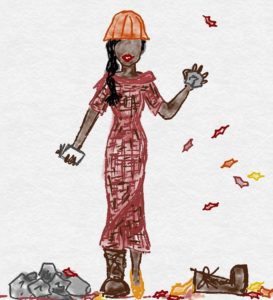
Early summer brings many of my favorite things. I get to visit the local nursery and spend way too much money on every annual flower that catches my eye. Lunches, dinners, cocktails, brunches, and even afternoon coffee take place outside on patios, piazzas, decks, and sidewalks. And sundresses and espadrilles are parts of a daily uniform.
But one of my absolute favorite early summer occurrences is the annual emergence of young, eager new male construction workers on all my jobsites. Wait – did I just say male workers? Is this going to be the start of a new, lecherous, politically incorrect phase in the life of Underpinnings? As interesting as that sounds (and lucrative), alas, the truth is much simpler and more wholesome.
Every year, young men everywhere graduate from high school and follow their fathers and uncles and grandfathers and mothers along a natural path into a wide variety of construction trades. These guys usually, if not always, are amazing examples of self-confidence and enthusiasm. They volunteer for every task. They say, “I can do that” with unabashed ease. They take pride in outlifting and outdigging and outworking everyone around them. And they eat everything in sight, constantly talking about and thinking about food.
(There might be some girls who enter the construction field when they graduate from high school, but I haven’t run into them on my jobsites. And I would bet that those few that are out there, somewhere, don’t have the ten-feet-tall-and-bulletproof attitude of their male counterparts).
Of course they have their obstacles. The older guys hide their tools. The jaded, experienced workers scoff at their swagger and interject a thousand cynical retorts for every ambitious proclamation. And the young guys’ inexperience and hubris often trips them up as they try to climb to the top in 20 seconds.
Regardless of their faults, I love these guys. I am in awe of their complete lack of angst. They don’t worry about letting anyone down. They don’t agonize about whether or not they can handle their jobs. They don’t overanalyze every co-worker’s words to determine if anyone is secretly disappointed in their performances or upset with them. And I think it goes without saying that any sane person would envy the ability to down three sausage egg biscuits and be hungry 30 minutes later.
Conversely, I have noticed that most women, when entering a new position or moving up into a new role, proceed at a much more cautious pace. We worry that we’re not smart enough or efficient enough or resourceful enough to do our jobs. The normally low buzz of panic and self-doubt that is the background music in our brains swells to a roar of incessant trepidation. Instead of being thrilled to have a new opportunity, we’re scared. We don’t need obstacles to crop up; we imagine them and spend all of our time dodging their looming specters in our brains.
The role of biology might have a partial role in this gender difference, particularly for women who are in male-dominated fields. We have the responsibility to nurture and protect our offspring, so we have to be a little less damn-the-torpedoes in our approach to life. We also have to be careful in a world where we’re typically smaller and weaker than the opposite sex.
My older brother would say that this natural caution is not natural at all, because he believes that there is no nature in the nature versus nurture debate, only nurture. His theory is that men and women would behave exactly the same if they were treated identically from birth. I don’t agree with him, but many people do. I believe that biology is part of the equation, but social development contributes as well. And maybe that’s where we can advance. A little bit of evolution in how we raise our daughters could produce a little less angst and a little more “I can do that!” We can do so many great things when we think about our jobs in terms of opportunity rather than potential failure.
My best friend (we’ll call her Environmental Girl, or EG for short) is a great example of how far a woman can go when she doesn’t hold herself back. A number of years ago, her company successfully bid on an environmental remediation project at an abandoned army airfield on an island in the middle of the Pacific Ocean populated only by endangered birds. (The blue footed booby frequently holds raves on the airstrip). The project would last several months, and the crew would travel to the island and stay there for the duration. No TV or radio, and hot coffee only when there was enough generator time available. EG said, “I want to go!”
This might seem bold, but it was particularly fearless given that her youngest daughter would be only 5 months old when the project would start. What??????
Many, many people said she was crazy. Her mother told her she was going straight to hell and she would need any profit from the job to pay for her infant daughter’s inevitable astronomical therapy costs when she got older. Female colleagues expressed shock and ran home to embrace their kids. But besides the fact that EG’s husband was a completely capable caregiver, as were her other 142 kids who all lived at home, the project only spanned a short time period. And it was a fabulous, once-in-a-lifetime opportunity! So she said yes, and she went. Damn more than the torpedoes – damn the whole fleet.
The experience was phenomenal, and EG learned things about herself she never would have otherwise. I am pleased to report that the endangered infant has grown into a daring chip off the adventurous old block, and she might be inclined to take on a project in the middle of the Pacific or take a position as chief of staff for the president of an international company and never doubt herself. When we doubt ourselves and hesitate to take chances and always put ourselves last, we teach our daughters to do the same. When we go after what we want and trust ourselves to be enough, we increase the chances that they will succeed.
Not every situation warrants a fearless attitude. Caution has its place. But self-confidence shouldn’t be an unknown quantity to women in the work world. We shouldn’t spend our time worrying about what we might do wrong, we should envision how high we can fly. Repeat after me – I can do that!
How Did You Get Here?
Diluting Workforce Quality for the Better…Or Not
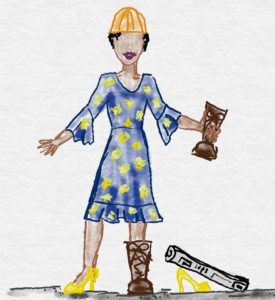
How did you get where you are? No, I’m not referring to your route to work this morning or whether you took a plane or a train to get to the conference you’re attending or how you managed to sneak out of the office to go shoe shopping. (But bravo to you, and find me some of those cute Jeffrey Campbell mules, would you?) How did you achieve your position? Was it years and years of 80-hour weeks and steady promotions? Did you take advantage of an equal opportunity hiring program? Or did you poison your previous supervisor? Don’t worry – there are no right answers here.
A friend of mine who works for a large company recently told me that her engineering manager decided the company needs more female engineers. She then was told that a recent hire of that very gender would be joining her group and would report directly to my friend. Hooray, right? Do that girl power cheer right there at your desk (or in front of the Manolo Blahnik display). This could be considered particularly good news given that my friend is quite the glass ceiling breaking pioneer herself. But, alas, her expression as she relayed the news didn’t hint at any joy. In fact, she was downright moribund.
After I persuaded her that tomorrow was another day and those Yankees can’t hurt us anymore*, she explained that the new hire was less than sterling. In fact, she was difficult to work with, defensive, unresourceful, and prickly. These characteristics had revealed themselves in short order as soon as the new employee had started work. In fact, administrative personnel even had complained about her. And now my friend was tasked with molding this young professional into a productive and valuable team member. Have you ever tried to mold brick? My friend was understandably torn between wanting to advocate more women in technical positions and envisioning numerous scenarios in which a freak act of nature demolished the company building and her new hire was the only unfortunate casualty.
This situation highlights the always pertinent question of whether equal opportunity programs are a help or a hindrance. It is an intensely complicated issue, and the answer varies significantly based on the year and the location.
Many years ago, highly qualified (and pleasant) women and minorities didn’t have the opportunity to even apply for many jobs, particularly positions in technical fields. There was no question of unqualified applicants slipping through the system because most women and minorities couldn’t even get close to the system. Applying for a job was almost a humorous proposition.
A prime example is a very prominent geo-structural engineer who applied for a position at a consulting firm in the early 1970s when she graduated from engineering school. She reported to the firm’s office and chatted with the principal engineer for a short time about the company and what type of work the firm did. As lunch approached, he apologized profusely and said a job emergency had come up and that his secretary would be taking her to lunch. The young engineer happily went to lunch, not knowing whether such an occurrence was normal or not. When she returned to the office, the boss found her, apologized again, and said it was time to talk about her desired position. He then led off by asking how many words a minute she typed. “Excuse me?” she said, confused. “I don’t really know.” He was appalled that she didn’t know and asked how she possibly could expect to get a job without being able to present her credentials. She timidly inquired how typing would figure into an engineering job, which brought the boss up short. “You’re here for an engineering job??? But you’re a…I mean…Are you serious?” Rest assured our outstanding young engineer left that interview and went on to do quite fabulous things. She still doesn’t know how many words a minute she types.
In such an environment, it was necessary to pave the way to allow women and minorities a chance at, well, a chance. I can say from personal experience that the interviewing environment is not so harsh today, and it wasn’t even that awful 15 years ago.
So the initial barrier has been broken. Does that mean we still need help? Are equal opportunity programs, both formal and informal, necessary? Or are we now setting ourselves backwards by forcing unqualified applicants into the pool in the name of equal numbers? Even worse, are we creating doubt about even the qualified candidates by diluting the quality of the overall disadvantaged workforce? The answer is nowhere near easy.
Of course you could say that there are plenty of sub-par and unpleasant representatives of the white male workforce, so why should we be any different? Maybe we shouldn’t be. In fact, that’s the general idea. If the percentage of women and men in any profession correlates to the general percentage of each gender in society, both groups should have some rude, insecure idiots in most fields. But do we want to force our idiots into some roles just to balance the ranks? Or do we want to reinforce our progress by concentrating on maintaining the quality of our gender in professional positions? As I said in the beginning, there are no right answers.
It is possible that the young lady my friend will be beating managing is brittle and defensive because she has grown up in a sexist, repressed environment. She hailed from a small rural community, so maybe her original ebullient personality was dimmed by a barrage of oppression and denied opportunities. Maybe she’ll turn into a shining star of an employee once she finds security and acceptance among her peers. I’m a perpetual optimist, so I like to think this might happen to an upbeat soundtrack followed by a cygnet-to-swan montage showing her transformation into a new engineering star. This is the theory behind equal opportunity programs.
There is a stronger possibility that my friend has been saddled with her own personal albatross, and this young woman’s troubles are simply the product of really bad genes and bitter parents. Although a great job opportunity can sometimes turn a person around, it is more likely that we will soon be making an advent calendar-ish wall hanging to creatively mark the days until her inevitable termination.
The question of equal opportunity probably is one that must be determined for each specific circumstance, defying convenient sweeping conclusions. Should we throw a party someday when we can say that there are as many female idiots in engineering and construction as male idiots? (Minorities, I’m not going to speak for you, but you’re in the same boat). I’m usually first in line to plan any party, but I don’t know that I’ll be ordering the centerpieces for this one.
*In order to understand many of the references in my Underpinnings pieces, you really should be familiar with football terminology and the classics, starting with Gone with the Wind. Move on to Love Actually, The Mummy, When Harry Met Sally, and The Devil Wears Prada after that. This is the bare minimum, but I can provide a full curriculum upon request.
What Price Ambition?
Hey – Your Ambition is Showing
By Ann Schmelzer, Guest Contributor

(Editor’s Note: Ann is a top-level manager for a major international manufacturer. Someday we will all be working for her, and that’s not a bad thing. Although she is not in the deep foundations industry, she spends all day every day with men, most of them engineers. It’s no wonder her right brain takes over on the weekends, doing things like starting one of the most successful food and beverage festivals in the Midwest and coaching raging hormones girls’ soccer).
The other day I sent Peggy a screen capture of an article I was reading that made me think of her. What I subsequently learned is: Be careful what you text your friends who have a blog that is topically relevant… I’m kidding.
The article I sent was Reese Witherspoon’s recent essay in Glamour on ambition (Glamour October 2017). The screen capture itself highlighted a study that single female Harvard MBA students downplayed their career ambitions in front of male classmates for fear of possibly hurting their marriage prospects. I’m not trying to share business that isn’t mine (we’ll get to my business later), but Peggy had a dating experience in which her full life and busy schedule were questioned by an unnamed gentleman in the following way— “But don’t you want to be happy?” Dear God… what year is it? Hence, why I sent Peggy the screen capture, and hopefully a much-justified chuckle.
Reese writes an eloquent essay on the topic of ambition. The fact that she had to is somewhat saddening to me; but, at least we’re talking about it. At one point she states “Run away from a man who can’t handle your ambition. Run. So many men think ambition is awesome and sexy!” I agree Reese, but a lot of men don’t wear “I find drive emasculating” on a T-shirt to the first date. You learn that the person in question says one thing and actually wants another over time—sometimes a little time, sometimes a lot of time.
In my case, I learned it slowly– death-by-a-thousand-papercuts-style over the course of four years. In my early twenties I dated a guy who, at the time, I was very much taken with and it seemed that the feeling was mutual. He talked a great game; I mean a great game. When we talked about my career ambitions there wasn’t a whiff of hesitation in his voice. He seemed to be genuinely into my ambition.
Things eventually crashed and burned during a period of time when his career was floundering. I, by contrast, was in the middle of two masters’ degrees and a career that wasn’t floundering. I’ll spare you, dear readers of Underpinnings, all the gory details but, in hindsight, the thing that made me the angriest was that I found out he had been cheating on me with the Sunday school teacher from his family’s church. The. Sunday. School. Teacher. The cheating alone was a bitter enough pill to swallow, but the chosen partner was really the icing on the cake. Don’t get me wrong, I’m guessing she didn’t know I existed. (If she did, the irony there is on an almost incomprehensible level). Upon Monday morning quarterbacking the whole situation, it is my assumption that his need for that relationship was to shield his ego from the uncomfortable mirror I held up to his own lack of progress. Perhaps that’s me shielding my own ego from the fact that my relationship crumbled because I couldn’t pull off the perfect balancing act of non-threatening and go-getter.
The thing is that I had never hid who I was and, in the beginning, it was the greatest thing ever. By the end, the look on his face all but said “wow, you’re really like this all the time”… and not in a good way. Did he think I was lying in the early days? If I had been, wouldn’t that have been worse for everyone? These are questions not worth pondering.
So, I was the MBA-educated girl who did not tamp down her ambition. If I had, perhaps I could have nursed that relationship along for a bit but, in the end, I’m sure it would have come to a similar demise. Regardless, there are lots of different ways to interpret the Harvard study. Maybe the women being interviewed thought “What’s the harm in softening the wording here? I can still go get it done; that’s my business”; or, “These questions rarely go well for me so here is my canned response”; or, “Remember when you beat that boy in the math bowl in middle school and got uninvited to the dance on Friday?”. There are a lot of possibilities but, in the end, what a difficult commentary on the state of gender equality.
Judith Warner, who is a senior fellow at The Center for American Progress writes “Although women have outnumbered men on college campuses since 1988, they have earned at least a third of law degrees since 1980, were fully a third of medical school students by 1990, and, since 2002, have outnumbered men in earning undergraduate business degrees since 2002. They have not moved up to positions of prominence and power in America at anywhere near the rate that should have followed. In a broad range of fields, their presence in top leadership positions—as equity law partners, medical school deans, and corporate executive officers—remains stuck at a mere 10 percent to 20 percent. Their “share of voice”—the average proportion of their representation on op-ed pages and corporate boards, as TV pundits, and in Congress—is just 15 percent. In fact, it’s now estimated that, at the current rate of change, it will take until 2085 for women to reach parity with men in leadership roles in our country.” With statistics like that, who can blame the women of Harvard?
Later in the article Reese comes back to “All we can do to create change is work hard. That’s my advice: Just do what you do well. If you’re a producer, you’ve got to produce. If you’re a writer, you’ve got to write. If you’re in corporate America, keep working hard to bust through the glass ceiling. If you want our voices to be represented in government—and I think we’re all getting behind that idea now—encourage women to run and help them with their campaigns. If you are one of those people who has that little voice in the back of her mind saying, “Maybe I could do [fill in the blank],” don’t tell it to be quiet. Give it a little room to grow, and try to find an environment it can grow in.” I couldn’t say it better myself.
Patterns for Success
Respond, don’t React
by Mia Painter, Guest Contributor

I was raised in a small family of women – mom, gram, two aunts, and a few cousins. My family had started out with some men, but the year I was two my grandfather and uncle died and my mom left my abusive father. I remember the women around me as strong, self-sufficient, generous, flexible, but only at times sensitive and outwardly loving. They all encouraged (and expected) me to do chores (lots of cleaning and mowing the lawn), to explore (keeping pet worms and having areas of the yard I could turn to mud factories), and to stand up for myself. Most importantly, I think, to who I am today – they expected me to do what I wanted to do, regardless of what those around me said. But here’s what I’ve been pondering lately…I think what I took from their lessons was to react, not to respond. My pattern of reaction (and not response) led me to where I am in my career. I’m (generally) happy with how my career has worked out but I wonder how it would have been had I responded more and reacted less. So now I’m starting to look at how I can respond to career situations and move forward with intention, not just reacting to situations with a gut reaction.
Reacting is what we instinctually or quickly do when an event or a decision or a confrontation happens. To me, reacting happens when I see something unjust or am exposed to a hard situation – and become angry or defensive or hurt. It also occurs when I see something as a challenge and charge forward to meet it head-on without much forethought.
Responding takes more effort and involves thinking things through. Responding means I keep my calm, think about what happened, and make an active, conscious decision about the best course of action (or inaction) to take. Responding isn’t always slower than reacting (though it certainly can be) but it is always about seeing a bigger and different perspective around the situation.
The most vivid memory of me reacting as a kid was in kindergarten (although it’s one of those memories that is now warped by my mom’s telling me about it so many times, so it’s a blend of my memory plus her story). It was free time and a boy (Brad) told me I couldn’t walk on the desks. Now maybe he meant that I shouldn’t, or that it wasn’t appropriate to stand on desks in school. But I heard him tell me I couldn’t do it and so I immediately took it as a challenge. I climbed up on the little kindergarten sized desks in my Catholic school jumper and walked around from desk to desk while the class looked at me in surprise. As you can expect, I was told to get down and to go to the principal’s office. My mom came to pick me up and asked what happened. I said Brad told me I couldn’t walk on desks and so I did. She told me good, that’s what I should have done! (And then followed it up with a discussion about appropriate times to walk on desks – i.e. not in class.)
Flash forward to college…end of my sophomore year and I had taken a variety of general classes but had not yet declared a major. My advisor told me I needed to pick a major now. I made my decision there and then in his office, and chose geology. Don’t get me wrong, geology is a good fit for me, but I didn’t do any long-term planning – I didn’t do any of the things I’d advise anyone who was choosing a career! I didn’t research options, would I need a master’s, what field of geology would I go into, what geographic region would I live in? I had taken “Geology for Consumers” the prior semester and it had included a field trip (as all good geology classes should). But something sparked in me that day when the class got out of the school van on the side of a road on top of a hill (all very much a typical day). That was the day I learned that I wasn’t just standing on a hill…I was standing on a drumlin! (A drumlin is an elongated hill formed by glaciers.) The hill got there somehow. The valley got there somehow. There was a process, a history, a predictable order to the landscape around us. I’m pretty sure that’s what my gut reaction was stirring up months later in my advisor’s office.
Ok, so I chose geology as a major. A year in and my new advisor suggested I double major and add in geophysics. I saw it as a challenge and agreed right away. Agreeing meant adding a year onto my undergraduate work, and it meant taking a slew of math and physics classes as well as geophysical coursework. Then I chose a graduate school and landed into the research that my advisor suggested. I was content, happy even. I got a job, moved, got married, had two babies, and kept working. All of this just happened as a series of my reactions to events that presented themselves to me. Each time I took the next logical step from where I was at any given moment.
But now I’m trying a different way. A few years ago while struggling with a loved one’s addiction, I learned the phrase “Respond, don’t React” and I applied it consciously in all aspects of that relationship. It helped me distance myself from the craziness of addiction enough to take care of myself. I eventually could see my loved one with a different perspective and it helped me continue to love them even amid the craziness. It helped me feel calmer, more in control of myself. In the past year I’ve had some challenging interactions with clients and staff, and one day the phrase “Respond, don’t React” came to me again. I realized I could apply this to my career as well – mainly in my day-to-day interactions to keep my calm and not do anything I’d regret!
Now I’m looking at my long-term goals and I’ve had the revelation that I can respond in situations and with decision-making to lead me to those goals. It had never occurred to me before the last couple months to me to write down career goals, and then to actually do something to achieve them. I’m not sure why this concept wasn’t part of my life to begin with – seems like it should be standard…have goals, do things to achieve them. But I can see now that a lot of my childhood was observing the women in my life reacting to their situations – grieving, moving on, getting out, raising kids, making ends meet. So many years of just doing the next logical step led me to this place, here, right now. It’s a pretty decent place. But now I want to try responding to the next career crossroad, situation, choice, and goal.
About me:
I’m a geologist and geophysicist for a civil engineering company. Much of my thoughts lately (when not focusing with all my might to meet deadlines, or to snuggle my boys, or to not be late for date night with my husband, or to keep our pet goldfish alive) are looking at how the decisions we all make shape our careers and the careers of those around us – particularly for women in an industry with mostly men, and for men in an industry with only a few women. Thanks Helen and Peggy for having me be a guest, it felt nice to have thoughts and to then write them down! Maybe there’s a pattern here.
